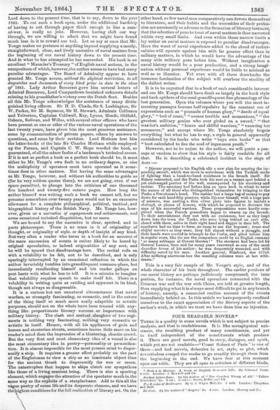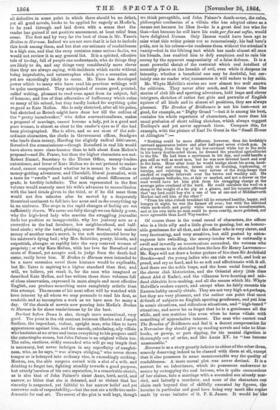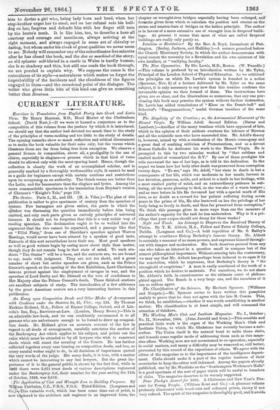FOUR READABLE NOVELS.*
THERE is a quality in some novels which is not subject to precise analysis, and that is readableness. It is like metaphysical sub- stance, the resulting product of many constituents, and yet in itself independent of the constituents which produce it. There are good novels, good in story, dialogue, and spirit, which yet are not readable—" Count Robert of Paris" is one of them--and bad novels, defective in art, style, or plot, which nevertheless compel the reader to go steadily through them from the beginning to the end. We have four at this moment upon our table. They are all open to criticism of different kinds,
* Brok. n to Harness. A Story of English Dem.sitie Life. By Edmund Yates. 3 vols. Londoa: J. Maxwell and Co.
Darkest before Dam!. By the Author of "The Cruelest Wrong of All," Fellow Travelers," Sc. 3 v014. Londwa : Smith, Eider, umI CO. The B yokes of Bridleasere. By G. J. Whyte Melv:Ile. 3 vols. London: -Chapman end Hell.
Rererses. By the Author of" Angelo," Ac. 2 vole. Loudou: Marna,' and Cu.
all defective in some point in which there should be no defect, yet all good novels, books to be applied for eagerly at Mudie's, to be read through and laid down with a sense that the reader has gained if not positive amusement, at least relief from ennui. The first and by very far the best of them is Mr. Yates's Broken to Harness, Indeed we are not sure that it is fair to include this book among them, and but that our estimate of readableness is a high one, and that the story contains some serious faults, we would not review it in any general list. It is a spirited, effective tale of to-day, full of people one understands, who do things they are likely to do, and say things very considerably more clever than they are always saying, with incidents which excite without being improbable, and catastrophes which give a sensation and yet are exceedingly likely to occur. Mr. Yates has developed power which to many who have read his previous writings will be quite unexpected. They anticipated of course good, pointed, salted writing, pleasant to read even apart from its subject, full of humour, and free of that affectation of buffoonery which ruins so many of his school, but they hardly looked for anything quite so good as Kate Mellon. She is only sketched, after all his pains, but sketched as Retsch might have done her till the outline of the "pretty horsebreaker," who defies conventionalisms, makes a proposal of marriage, cannot become a lady, yet is a good and pure woman, is almost as clear to the reader's eyes as if she had been photographed. She is alive, and so are most of the sub- ordinate characters, the clerks in Government offices, Scadgers who lends them money, Harding the slightly radical litterateur, Beresford the commissioner—though Beresford in real life would have shown more class-honour than to talk about Kate Mellon's proposal—and Dr. Prater, but then the higher characters are not. Robert Simnel, Secretary to the Tintax Office, money-lender, extortioner, and lover of Kate Mellon we do not-pretend to under- stand, cannot comprehend whether he is meant to be villain or money-getting adventurer, and Churchill, liberal journalist, with a taste for " swells " and habit of talking about differences of grade, is terribly indefinite. The man represented in the first volume would scarcely meet his wife's advances to reconciliation with the hard tirade given in the third, or if he did meet them would not five minutes after be moved by a desperately theatrical sentiment to fall into her arms and make everything up in an embrace. The steps in the rapid changes of feeling are not sufficiently shown. We never see fully though we can faintly guess, why the high-bred lady who marries the struggling journalist finds her position so insupportable, why her jealousy acts as a corrective to the bad furniture, low neighbourhood, and half- bred circle; why the hard, plotting, usurer Simnel, who makes money of another man's secret, is the soft sentimental lover by his mistress's dying bed; why Mrs. Schroder, pretty, blonde, and coquettish, changes so rapidly into the very reserved woman of propriety ; or why Kate Mellon, with her love for Beresford and scorn of Simnel, yet accepts and, to judge from the deathbed Beene, really loves him. If Broken to Harness were intended to be a mere sensation novel these hiatuses would be explicable, but Mr. Yates is aspiring to a higher standard than that, and will, we believe, yet reach it, for the man who imagined or described Kate Mellon, and has written these three volumes full of close observation, expressed in most simple and most effective English, can produce something more completely artistic than this attempt. The success of his next effort will be watched with keen interest by all whom we may persuade to read his first, as readable and as incomplete a work as we have seen for many a day. Of the shoals of novels now pouring into llludie's Broken to Harness is for sheer readableness by far the best.
Darkest beore Dawn is also, though more sensational, very good. The point is the old contrast between Charles and Joseph Surface, the imprudent, violent, upright man, who likes to have appearances against him, and the smooth, calculating, oily villain who hesitates at no crime and turns everything to his purpose until the catastrophe comes, but John Palmer is an original villain too. The calm, cautious, sickly scoundrel who will go any length that is necessary, but never indulges in any superfluity of naughti- ness, who, as he says, "was always obliging," who never shows temper or is betrayed into ordinary vice, is exceedingly striking. Horton, too, the able surgeon cursed with a slut of a wife, and drinking to forget her, fighting steadily towards a good purpose, but utterly:careless of his own reputation, is a remarkable sketch, as is also that of John Palmer's sister Anne, hard, acrid, and narrow, so bitter that she is detested, and so violent that her sincerity is suspected, yet faithful to her narrow belief and yet narrower code of respectability,—but the rest are a trifle too melo- dramatic for real art. The secret of the plot is well kept, though
we think perceptible, and John Palmer's death-scene, the calm, philosophic confession of a villain who has adopted crime as a
means not because he likes it—he is a great deal too wise for that—but because he will have his endsper fas ant nefas, would have delighted Dumas. Only llamas would have been apt to miss what this writer points out so remorselessly, his bad hero's pride, not in his crimee—he confesses them without the criminal's vanity—but in the lifelong tact which has made almost all men his friends, has enabled him to defy suspicion and to ruin hie enemy by the apparent magnanimity of a false defence. It is a most powerful sketch of the restraint which real intellect of necessity places on the breadth of evil, even while it deepens its intensity, whether a beneficial one may be doubtful, but cer- tainly one no reader who: commences it will endure to lay aside.
Mr. Whyte Melville's stories are now almost too well Known for criticism. They never alter much, and to those who like stories of club life and sporting adventure, bold leaps and clever intrigues, sketches of rather fast girls and portraits of English squires of all kinds and in almost all positions, they are always pleasant. The Brookes of Bridleniere is not his best—not so good, for example, as " Digby Grand "—but it is among his best, contains his whole repertoire of characters, and more than his usual profusion of short telling sketches, which always suggest Trellope's and yet never approach them. Compare this, for example, with the picture of Earl De Guest in the "Small House at Allington":— ." Nothing could be more different, however, than his lordship's outward appearance before and after half-past seven o'clock p.m. Is the morning, from the top of his low-crowned white hat to the nails in his heavy double-soled shoes, he dressed the practical agriculturist to the life. Ho had been a sportsman in his day, and could handle a gun still as well as most men, but he was now devoted heart and soul to the farm. Hour after hour he would trudge about his acres, heed- less of wind and weather, intent only on draining, topdressing, or turnips, and rejoicing in the very savour of the dung-heaps that smoked at regular intervals over the brown and wealthy soil. He could cheapen bullocks, too, at fair or market, and not a drover on the road would have let him pick from his straggli,ng charge at the average price overhead of the herd. He could calculate the wool on a sheep or the weight of a fat pig at a glance, and his tenants affirmed that my lord could buy e'er a one of 'em at one end of Middlesworth Market and sell him at the other !'
"From his nine o'clock breakfast till he returned healthy, happy, and hungry at night, he was the farmer all over ; but with the starched white neck-cloth and portly white waistcoat came a transformation, and at his own table no man could be more courtly, more polished, nor more agreeable than Lord Waywarden."
Of course there is the usual round of characters, the officer who is a little silly and a little given to gaming, but an honour- able gentleman for all that, and the officer who is very clever, and very faseinatins, and very sensitive, but still pushed by extra- vagance into swindling, the money-lender who is outwardly a swell and inwardly an unscrupulous scoundrel, the veteran who always seems to us sketched from the late Sir Henry Lawrence— Mr. Kaye will not draw a better picture of him than Sir Archibald Brooks—and the young ladies who can ride so well, and look so proud, and cry so hard, and be so soft and affectionate with it all. And there are the noble leaps, and the keen social fencing, and the clever club historiettes, and the Oriental story (this time about Abd el Kader), and the villanous love-hunting and sub- dued chivalric love-making, and all the scenes which Mr. Whyte Melville's readers expect, and except when he fairly mounts hie Eastern hobby usually obtain. They are not very high art perhaps, but they are very pleasant, and the author can paint that most difficult of subjects an English sporting gentleman, and put Min in comic situations, and ridiculous situations, and "high-toned" situations, and never let us forget that he is a gentleman all the while, and one watches him even when he turns villain with something of appreciative interest. The man who cannot read The Brookes of Bridlemere and feel it a decent compensation for a November day should give up reading novels and take to blue- books, or gossip, or port sipping, for his mental digestion is thoroughly out of order, and like Louis XV. he "has become
unamusable."
-Reverses is as a story greatly inferior to either of the other three, scarcely deserving indeed to be classed with them at all, except that it also possesses in some unaccountable way the quality of readableness. A more unreal plot was never devised. It is a contest for an inheritance, which its possessors endeavour to secure by entrapping the real heiress, who is quite uncouscious of her claims, into a marriage with a scoundrel son already mar- ried, and latterly a murderer, and none of the characters can claim rank beyond that of skilfully executed lay figures, the heroine in particular and good hero being very much like copies made by some imitator of G. P. R. James. It would be' like him to devise a girl who, being lady born and bred, when her step-brother urges her to steal, and on her refusal sets his bull- dog on her, forgives and defends him with her finger still torn by the brute's teeth. It is like him, too, to describe a hero all courtesy and courage and manliness, always arriving at the right moment, and always engaged in some act of chivalry or daring, but whom under his cloak of great qualities we never seem to see. Nobody will remember any of the subordinates five minutes after he has closed the book, and the dea ex machinet of the story, an old spinster self-bliried in a castle in Wales is hardly human, she is so shadowy and thin, but still one reads the book through', we are puzzled to explain why. We suppose the cause is the naturalness of its style—a naturalness which makes us forget the improbability of the incidents and the cloudiness of the figures engaged in them—and the occasional point of the dialogue. The writer who gives little hits of this kind can give us something better than Reverses.




































 Previous page
Previous page